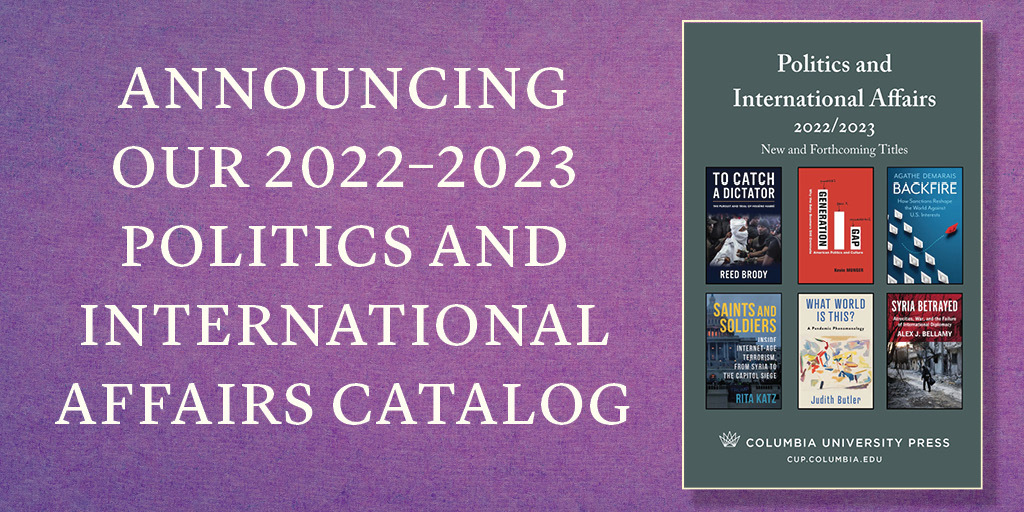Announcing Our 2022-2023 Politics and International Affairs Catalog

Letter from the editors:
We are proud to present this year’s selection of titles in political science, international relations, and political theory.
Our American politics list is split between domestic politics and American foreign relations, but both lists consider issues of contemporary concern and their deep institutional roots. In Generation Gap, Kevin Munger explores the structural advantages that have given the baby boomer generation unprecedented economic, political, and cultural control.
In Securing Borders, Securing Power, Mike Slaven traces the rise and fall of border control as an issue of national security, using Arizona state politics as a case study. And in The Modern Presidency, Michael A. Genovese considers the office through the lens of six key debates that define the institution.
Lost in the Cold War contains the memoirs of Jack Downey, the longest-held POW in American history, captured during the Korean War and held in a Chinese prison for more than twenty years. In Rumbles of Thunder, Steven Chan tests the likelihood of a Sino-American faceoff over Taiwan. Finally, in Ideology in US Foreign Relations, coeditors Christopher McKnight Nichols and David Milne identify the role of ideology in America’s idea of its place in the world, from its founding to the present day.
In international affairs, current global events hold a central place on our list. Agathe Demarias’s Backfire: How Sanctions Reshape the World Against U.S. Interests looks at how the global economy shifts to exclude the United States when faced with American sanctions, diminishing the power they purport to have. Global Environmental Politics: The Transformative Role of Emerging Economies, by Johannes Urpelainen, examines how global climate and environmental efforts can successfully include the particular needs of developing nations.
In Syria Betrayed: Atrocities, War, and the Failure of International Diplomacy, Alex J. Bellamy looks at the way that the international community failed to protect the Syrian people, providing a vivid cautionary tale in the midst of Russian aggression in Ukraine. And, in a time when climate change, war, and pandemic externalities have upended food systems, Universal Food Security: How to End Hunger While Protecting the Planet by Glenn Denning draws on his four decades of experience to outline an ecologically-sound strategy to broaden access to healthy diets around the world.
In political theory we have some very exciting titles to announce, beginning with Judith Butler’s What World Is This? A Pandemic Phenomenology. Butler argues that the pandemic has challenged our very senses, breath and touch, and our idea of an individual self; they invite us to enter a world of essential interrelationship and to fight for a radical social equality. Another standout title, The Green New Deal and the Future of Work, an exciting new collection edited by Craig Calhoun and Benjamin Y. Fong, makes the case that the environmental and economic crises are one and the same and offers bold new strategies for creating jobs while reducing carbon consumption.
Happy reading!
Caelyn Cobb, editor, global politics
Wendy Lochner, publisher, political theory
Stephen Wesley, editor, American politics
Categories:Book ExcerptCatalogsColumbia University PressPolitics
Tags:Agathe DemaraisAlex J. BellamyBackfireBenjamin Y. FongCaelyn CobbChristopher McKnight NicholsCraig CalhounDavid MilneGeneration GapGlenn DenningGlobal Environmental PoliticsIdeology in U.S. Foreign RelationsJack Lee DowneyJohannes UrpelainenJohn T. DowneyJudith ButlerKevin MungerLost in the Cold WarMichael A. GenoveseMike SlavenRumbles of ThunderSecuring BordersSecuring PowerStephen WesleySteve ChanSyria BetrayedThe Green New Deal and the Future of WorkThe Modern PresidencyThomas J. ChristensenUniversal Food SecurityWendy LochnerWhat World Is This?





